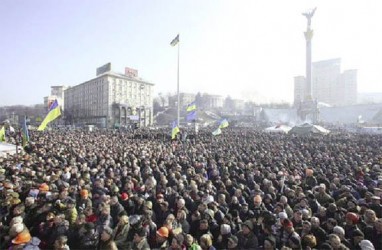KIEV, (Reuters) – Ukraine’s opposition leaders signed an EU-mediated peace pact with President Viktor Yanukovich yesterday, winning a raft of concessions in a delicate deal to end violence that killed at least 77 people and turned the capital into a battle zone.

By nightfall, opposition leaders who signed the deal were addressing peaceful crowds from a stage in Independence Square, which for the past 48 hours had become an inferno of blazing barricades, where protesters were shot dead by police snipers.
But the crowd was still defiant, holding aloft open coffins of slain demonstrators and making speeches denouncing the opposition leaders for shaking hands with Yanukovich.
If it holds, the deal – hammered out with the mediation efforts of the foreign ministers of France, Germany and Poland – would mark a victory for Europe in a tug-of-war with Moscow for influence in the divided ex-Soviet state of 46 million people.
But it remains to be seen whether violence can be halted and whether a lurch away from Moscow will cost Ukraine a $15 billion Russian financial lifeline it needs to stave off bankruptcy.
Under pressure to quit from mass demonstrations in Kiev, Russian-backed Yanukovich agreed to create a national unity government, change the constitution to reduce his powers and leave office early for new elections.
“There are no steps that we should not take to restore peace in Ukraine,” the president said in announcing his concessions before the agreement was signed. “I announce that I am initiating early elections.”
Within hours, parliament voted to revert to a previous constitution slashing Yanukovich’s prerogatives, sacked his interior minister blamed for this week’s bloodshed and amended the criminal code to pave the way to release his rival, jailed opposition leader Yulia Tymoshenko.
EU leaders and the White House praised what European Council President Herman Van Rompuy called a “necessary compromise”. Moscow made grudging comments that fell short of endorsing the deal. The European envoys signed the document as witnesses, but a Russian envoy did not.
That envoy, Vladimir Lukin, acknowledged that Moscow had fallen behind the EU in the latest diplomacy: “The EU representatives were in their own way trying to be useful, they started the talks.
“We joined the talks later, which wasn’t very right. One should have agreed on the format of the talks right from the start,” Lukin was quoted as saying by Interfax news agency.
Yanukovich, 63, a towering former Soviet regional transport official with two convictions for assault, did not smile during a signing ceremony at the presidential headquarters. Opposition leader Vitaly Klitschko, a retired world boxing champion, switched his nameplate to avoid sitting next to the president.
Polish Foreign Minister Radoslaw Sikorski described the agreement as a “good compromise for Ukraine”. It “gives peace a chance. Opens the way for reform and to Europe,” he tweeted.
It fell to Sikorski to sell the deal to the sceptical opposition. ITN video filmed outside a meeting room during a break in the talks showed him pleading with opposition delegates to accept it: “If you don’t support this, you’ll have martial law, you’ll have the army, you’ll all be dead.”
PROTESTERS STAND THEIR GROUND
Anti-government protesters remained encamped in Independence Square, known as the Maidan or “Euro-Maidan”, and made clear their dissatisfaction at a deal that would leave Yanukovich in power until the early elections later this year.
Shortly after the signing ceremony, an open coffin carrying one of the dead from Thursday’s violence, was borne across the square as a bare-chested drummer beat out a funeral tattoo with people chanting “Heroes don’t die! Bandits out!”
Some car horns hooted and fireworks were lit to celebrate the accord, but many activists were suspicious, noting that Yanukovich had cut deals before and was still in office.
When the three opposition politicians who signed the deal addressed the crowd in the evening, another coffin carrying a victim was borne through the crowd to the stage, apparently catching the leaders off guard. After another open coffin was held aloft by the crowd, a protester wearing battle-fatigues leapt to the microphone in front of the opposition leaders.
“My comrade was shot and our leaders shake the hand of a murderer. It’s a disgrace!” he said to roars of approval. “If it is not announced by 10:00 tomorrow that Yanukovich is gone, we’re going to attack with weapons.”




